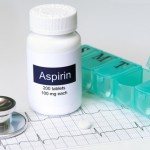
Aspirin bottle via Shutterstock
The world s largest clinical trial on aspirin was recently launched in the United Kingdom, with the aim to determine whether taking daily aspirin will stop, or delay cancers caught and treated at an early stage, from returning.
The trial is funded by the National Health Service s National Institute for Health Research.
The first of its kind study called Add-Aspirin is a phase III trial that will include 11,000 patients at more than 100 centers across the UK. The goal of the study will be to assess what impact aspirin will have on participants who are having or have had treatment for bowel, breast, esophagus, prostate or stomach cancer. The participants will be randomized into groups taking either 100 mg of aspirin, 300 mg of aspirin, or a placebo daily over a period of twelve years.
There s been some interesting research suggesting that aspirin could delay or stop early stage cancers coming back, but there s been no randomised trial to give clear proof," Dr. Ruth Langley, chief investigator from the Medical Research Council Clinical Trials Unit at University College London said.
"This trial aims to answer this question once and for all. If we find that aspirin does stop these cancers returning, it could change future treatment providing a cheap and simple way to help stop cancer coming back and helping more people survive.
Professor Tom Walley, director of the NIHR Health Technology Assessment (HTA) Programme, said, We have funded the Add-Aspirin trial because it offers the exciting possibility of improved outcomes for patients, with a simple well tolerated intervention. The NIHR HTA Programme prides itself on funding pragmatic clinical trials like this that can lead to tangible benefits to patients and could help fill important knowledge gaps for the NHS.
The benefits of aspirin have been known for thousands of years. Ancient Egyptians used willow bark as a remedy for aches and pains. Aspirin s active ingredient, salicyclic acid, can be found in the bark of the willow tree. Hippocrates (460 B.C. 377 B.C.) acknowledged that willow leaves and bark were capable of reducing pain and fever.
Felix Hoffman, a chemist at the Bayer company in Germany, used acetylsalicylic acid to treat his father s rheumatoid arthritis in the 1890 s, and in 1899 the company distributed aspirin in powder form for doctors to prescribe to patients. Its popularity led to the drug becoming available over-the-counter in 1915.
Aspirin is already widely recognized for its beneficial role in the primary and secondary prevention of cardiovascular disease events (i.e. strokes, heart attacks). There is a growing body of evidence that aspirin (and other non-steroidal anti-inflammatory drugs) inhibit colorectal cancer, metastases and death. Additionally, it is associated with decreased incidence of other solid cancers and subsequent death.
High-quality evidence exists to suggest a reduction in colorectal polyps and cancer with aspirin use depending on the dose and duration of therapy. A meta-analysis to investigate low-dose aspirin s beneficial effect on other cancers revealed a significant reduction in all cancers. The benefit was observed beginning at four years, with an increased benefit beyond four years. These benefits were independent of age, gender and smoking status. The mortality benefits may not be as apparent in short-term versus long-term studies.
Hence, why the length of the UK Add-Aspirin trial is important to see the mortality benefit associated with aspirin use, in a large, randomized and controlled trial. The results will provide causality while washing out the potential for bias. As an affordable, well tolerated drug by most, aspirin is the optimal study drug.



